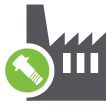Realize More Value Through Your Manufacturing Enterprise
Optimas is a tech-enabled industrial manufacturer/distributor that delivers fasteners, inventory management and production related solutions that help global producers elevate output and reduce costs. As one of the US’ top precision manufacturing solution companies, Optimas has been partnering in our customer’s success for over 100 years.

MINIMIZE YOUR
SUPPLY CHAIN RISK
Stay competitive with a streamlined supply chain, global sourcing and readily available inventory.

OPTIMIZE YOUR
INVENTORY
Produce more with less. Reduce your inventory, eliminate waste and prevent downtime.

ENHANCE YOUR
OPERATIONS
Do more with less. Free up your staff to focus on what matters most.

IMPROVE YOUR
QUALITY
Manufacture cutting-edge products that your customers trust with a “best-in-class” product range.
Real Results, Real Impact
Read real stories of how Optimas Solutions inventory optimization, industrial supply solutions, design and engineering solutions have helped our customers across the country streamline operations and save money here.
Streamlined number of suppliers needed by 20%
Reduced $1.8 million in unnecessary costs
Saved $5.9 million in lifetime costs
Improved part quality by 95%
How Can We Help You Efficiency Up?
Optimas’ industrial supply solutions have boosted the operational efficiency for countless companies – but how can we help yours? Get in touch with one of our knowledgeable experts today.
An Extension of Your Team
Rely on our deep industry and manufacturing expertise to create tailored programs that build and scale to your business and drive your efficiency up. At Optimas, we are experts in logistics and supply chain management, and can optimize your business from industrial procurement to quality control. As an extension of your current team, our range of specialties includes:

SUPPLY CHAIN
MANAGEMENT
Reduce risk, improve lead times and save labor costs by working with a single source.

QUALITY
CONTROL
Know you’re in good hands with our zero-defect culture and “best-in-class” product range.

GLOBAL
SOURCING
Take advantage of our vast supplier network, leveraged buys and global footprint.

INVENTORY
MANAGEMENT
Stock only the parts you need, where and when you need them.

INNOVATIVE
TECHNOLOGY
Make data-driven decisions to streamline your processes and improve your productivity.
Optimize Your Inventory
Enhance Your Operations
Improve Your Quality

WORLD-CLASS
MANUFACTURING
Capacity and expertise to manufacture all your specific fastening needs.

MANUFACTURING CONSUMABLES
Access in-demand PPE and MRO products, plus standard parts, to keep people and facilities safe.

PROCESS IMPROVEMENT
& ENGINEERING
Count on our proactive expertise to drive efficiencies and savings across your operations.

PART DESIGN
& TESTING
Partner with our engineers to design and test your parts to increase performance.

KITTING &
ASSEMBLY
Increase your efficiency with pre-packaged kits and customized parts.
By consolidating two separate part numbers into one standard component, Optimas was able to generate a 71% decrease in cost per item, delivering a $200,000 saving in materials procurement. The new consolidated component also reduced installation times, providing a compound labor saving and enhancing our operational efficiency.
– A Leading Truck Manufacturer
Optimas has the flexibility and speed to react to our fluctuations in demand. Stockouts are not an option for us and Optimas has done a really good job supporting us to improve our forecasting accuracy.
– Director, Purchasing, Semiconductor Manufacturer
The Optimas part standardization program not only reduced our piece part costs, but it also enabled us to launch new products quicker, decrease inventory obsolescence, improve product quality and increase customer satisfaction.
– Rainer Schulze, Global Commodity Director, Metals & Mechatronics, Faurecia
Optimas supplies us with over 500 million fasteners to thousands of manufacturers globally. They maintain a quality level of less than 1 PPM.
– VP of Purchasing, Powertrain OEM

